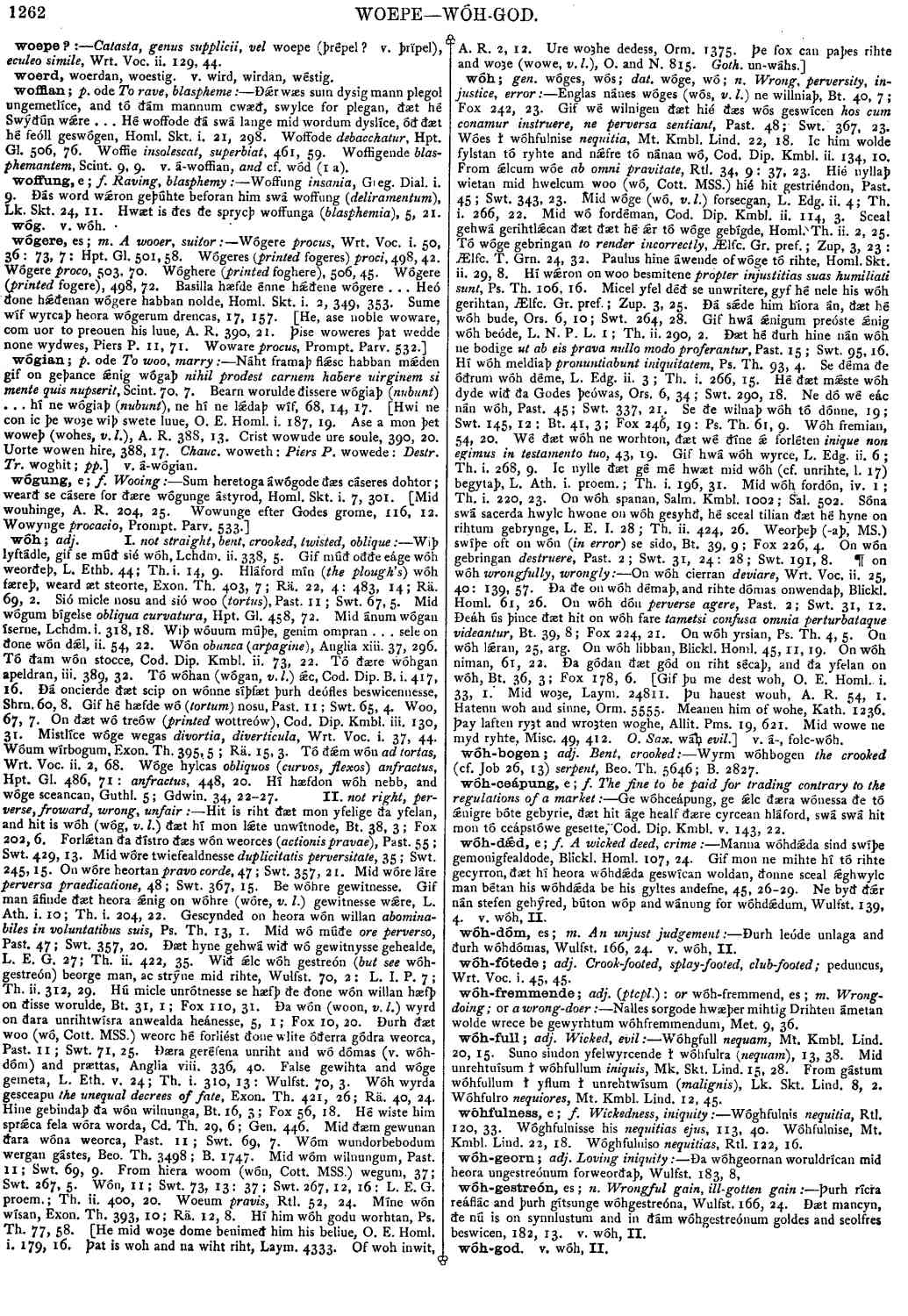wóh
- noun [ neuter ]
-
Englas nánes wóges (wós, v. l. ) ne wilíniaþ.
- Bt. 40, 7 ;
- Fox 242, 23.
-
Gif wé wilnigen ðæt hie ðæs wós geswícen
hos cum conamur instruere, ne perversa sentiatit,
- Past. 48;
- Swt. 367, 23.
-
Wóes ł wohfulníse
nequitia.
- Mt. Kmbl. Lind. 22, 18.
-
Ic him wolde fylstan tó ryhte and nǽfre tó nánan wó,
- Cod. Dip. Kmbl. ii. 134, 10.
-
From ǽlcum wóe
ab omni pravitate,
- Rtl. 34, 9 :
- 37, 23.
-
Hié nyllaþ wietan mid hwelcum woo (wó,
- Cote. MSS.
- Past. 45 ;
- Swt. 343, 23.
-
Mid wóge (wó, v.l. ) forsecgan,
- L. Edg. ii. 4 ;
- Th. i. 266, 22.
-
Mid wó fordéman,
- Cod. Dip. Kmbl. ii. 114, 3.
-
Sceal gehwá gerihtlǽcan ðæt ðæt hé ǽr tó wóge gebígde,
- Homl. Th. ii. 2, 25.
-
Tó wóge gebringan
to render incorrectly,
- Ælfc. Gr. pref. ;
- Zpp, 3, 23 :
- Ælfc. T. Grn. 24, 32 .
-
Paulus hine áwende of wóge tó rihte,
- Homl. Skt. ii. 29, 8.
-
Hí wǽron on woo besmitene
propter injustitias suas humiliati sunt,
- Ps. Th. 106, 16.
-
Micel yfel déð se unwritere, gyf hé nele his wóh gerihtan,
- Ælfc. Gr. pref. ;
- Zup. 3, 25.
-
Ðá sǽde him hiora án, ðæt hé wóh bude,
- Ors. 6, 10 ;
- Swt. 264, 28.
-
Gif hwá ǽnigum preóste ǽnig wóh beóde,
- L. N. P. L. I ;
- Th. ii. 290, 2.
-
Ðæt hé ðurh hine nán wóh ne bodige
ut ab eis prava nullo modo proferantur,
- Past. 15 ;
- Swt. 95, 16.
-
Hí wóh meldiaþ
pronuntiabunt iniquitatem,
- Ps. Th. 93, 4.
-
Se déma ðe óðrum wóh déme,
- L. Edg. ii. 3 ;
- Th. i. 266, 15.
-
Hé ðæt mǽste wóh dyde wið ða Godes þeówas,
- Ors. 6, 34 ;
- Swt. 290, 18.
-
Ne dó wé eác nán wóh,
- Past. 45 ;
- Swt. 337, 21.
-
Se ðe wilnaþ wóh tó dónne,
- 19 ;
- Swt. 145, 12 :
- Bt. 41, 3 ;
- Fox 246, 19 :
- Ps. Th. 61, 9.
-
Wóh fremian,
- 54, 20.
-
Wé ðæt wóh ne worhton, dæt wé ðíne ǽ forléten
inique nan egimus in testamento tuo,
- 43, 19.
-
Gif hwá wóh wyrce,
- L. Edg. ii. 6 ;
- Th. i. 268, 9.
-
Ic nylle ðæt gé mé hwæt mid wóh (cf. unrihte,
- 1. 17
- L. Ath. i. proem. ;
- Th. i. 196, 31.
-
Mid wóh fordón,
- iv. I ;
- Th. i. 220, 23.
-
On wóh spanan,
- Salm. Kmbl. 1002 ;
- Sal. 502.
-
Sóna swá sacerda hwylc hwone on wóh gesyhð, hé sceal tilian ðæt hé hyne on rihtum gebrynge,
- L. E. I. 28 ;
- Th. ii. 424, 26.
-
Weorþeþ (-aþ,
- MS.
- Bt. 39, 9 ;
- Fox 226, 4.
-
On wón gebringan
destruere,
- Past. 2 ;
- Swt. 31, 24 :
- 28 ;
- Swt. 191, 8.
-
On wóh cierran
deviare,
- Wrt. Voc. ii. 25, 40 :
- 139, 57.
-
Ða ðe on wóh démaþ, and rihte dómas onwendaþ,
- Blickl. Homl. 61, 26.
-
On wóh dón
perverse agere,
- Past. 2 ;
- Swt. 31, 12.
-
Ðeáh ús þince ðæt hit on wóh fare
tametsi confusa omnia perturbataque videantur,
- Bt. 39, 8 ;
- Fox 224, 21.
-
On wóh yrsian,
- Ps. Th. 4, 5.
-
On wóh lǽran,
- 25, arg.
-
On wóh libban,
- Blickl. Homl. 45, II. 19.
-
On wóh nitnan,
- 61, 22.
-
Ða gódan ðæt gód on riht sécaþ, and ða yfelan on wóh,
- Bt. 36, 3 ;
- Fox 178, 6.
- O. E. Homl. i. 33, i.
- Laym. 24811.
- A. R. 54, l.
- Orm. 5555.
- Kath. 1236.
- Allit. Pms. 19, 621.
- Misc. 49, 412.
Bosworth, Joseph. “wóh.” In An Anglo-Saxon Dictionary Online, edited by Thomas Northcote Toller, Christ Sean, and Ondřej Tichy. Prague: Faculty of Arts, Charles University, 2014. https://bosworthtoller.com/36410.
Checked: 1